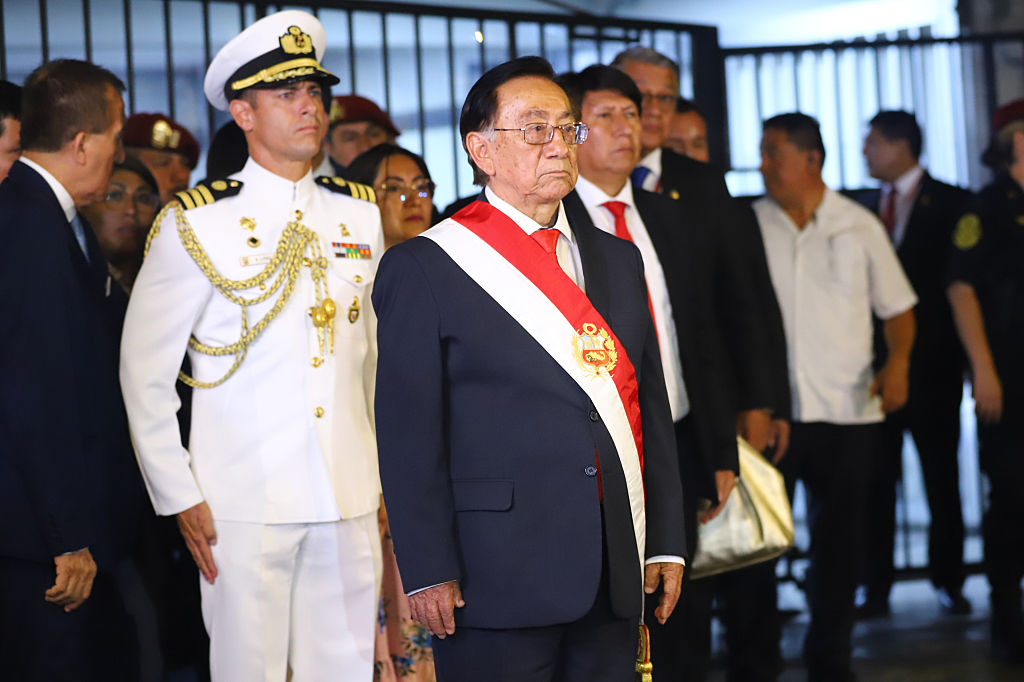PRI's Peña Nieto Wins Mexico's Election
PRI's Peña Nieto Wins Mexico's Election
Long considered the frontrunner, the Institutional Revolutionary Party’s Enrique Peña Nieto won Mexico’s July 1 election. Observers debate what the return of the PRI could mean for Mexico.
Updated July 2, 2012 - Mexicans elected Enrique Peña Nieto on July 1 after a presidential race that placed him as the frontrunner since early in the campaign. With 83 percent of votes counted, he held 37.5 percent of the vote, or about five points more than the Party of the Democratic Revolution’s (PRD) Andrés Manuel López Obrador. The governing National Action Party’s (PAN) Josefina Vázquez Mota came in third. Peña Nieto did not need a majority of votes to win as there are no runoff elections in Mexico; the candidate who wins the largest portion of votes takes office for one six-year term starting in December. Ahead of Sunday's election, observers debated what the return of the PRI, which ruled Mexico for seven decades before 2000, could mean for the country.
Peña Nieto, the former governor of the state of Mexico, was considered the favorite since he announced his candidacy for the PRI in November 2011. Still, he’s experienced slip-ups along the way. During a December book fair, he failed to name three books that inspired him and, shortly after that, it surfaced that he had children out of wedlock. More recently, his campaign faced a challenge and protests from the #YoSoy132 student movement. But, as July 1 neared, Peña Nieto maintained a strong poll lead over his rivals. During his victory speech, he pledged reconciliation, saying: "I will govern with all and for all."
Meanwhile, the race for the second spot was far from clear. Since the start of the official campaign in March, Vázquez Mota saw her lead over ex-Mayor of Mexico City López Obrador (better known as AMLO) whittled away so the two polled neck-and-neck as the voting day neared. While they polled within a margin of error before Sunday, ADN Político’s “Poll of Polls” showed AMLO’s lead over Vázquez Mota widening at the end of campaigning on June 27. This could owe to recent security snafus that potentially hurt the PAN candidate’s poll figures while AMLO’s campaign drew nearly half a million spectators in Mexico City on Wednesday. But, as the vote counts came in, Vázquez Mota moved her election-night speech to an earlier time, conceding that the voter counts appeared not to favor her. Indeed, initial exit polls put her five points behind AMLO, leaving the ruling party in third place. (AMLO had not conceded as of 8:30 a.m. ET).
The Peña Nieto victory raises questions about the return of the PRI to Los Pinos. Before the 2000 election of the PAN’s Vicente Fox, the PRI ruled Mexico for more than seven decades with what Reuters called “an iron first and frequent allegations of corruption.” As such, the PRI’s imminent return has raised some eyebrows. But as The Economist put it: “If the PRI has managed to win its way back into Mexican hearts, that is partly a verdict on its opponents.” An article in The New York Times says: “clean elections and a free press are now taken for granted, but corruption is still rampant, poverty is widespread, economic growth has been slow and an army-led ‘war on drugs’ has resulted in a mind-boggling death toll.”
The reaction to a PRI return is mixed. Some, such as John M. Ackerman of the National Autonomous University of Mexico, believe a PRI comeback signals a return to old politics. “The PRI has not cleaned up its act or modernized over the last 12 years,” Ackerman writes for The Los Angeles Times. “To the contrary, it has deepened its networks of corruption and illegality in the territories it still controls.” Still, others, such as the Council on Foreign Relations’ Shannon O’Neil argue that “Mexican democracy has evolved in ways that make a return to wholesale PRI dominance unlikely.” Mexico’s ex-Foreign Minister Jorge Castañeda similarly argues that “to fear an authoritarian restoration would be to deny everything that we have all achieved over the last 12 years.” Former New York Times reporter Alan Riding concludes what he believes a likely scenario: “[I]f elected, Mr. Peña Nieto will try to please everyone and will disappoint many. And if he governs only for the PRI’s old pals, he can expect to hear from the Mexican street again.”
Mexico's electoral agency placed voter turnout at over 60 percent. Voting was largely peaceful, although ballot shortages sparked protests in the capital while violence in the southern state of Chiapas led to the closing of some voting centers.
Learn More:
- Access a map from Mexico's electoral council showing state-by-state voter turnout.
- Read an AS/COA Online News Analysis about the #YoSoy132 movement and concerns over Mexican media coverage of the elections.
- Read an AS/COA Online News Analysis which explores the validity of Mexican polling firms.
- Access a Mexico Election Guide from AS/COA Online for quick facts, links, social media information, and more.
- Mexican political blog Animal Politico explains what to expect from the elections over the next week.
- A piece in The Economist offers an analysis of the election, and what Peña Nieto’s return could mean for Mexico.
- Dueling op-eds in The Los Angeles Times by John M. Ackerman of the National Autonomous University of Mexico and former Mexican Foreign Minister and NYU Professor Jorge Castañeda debate what a PRI presidency would entail.
Carin Zissis contributed to this analysis.







